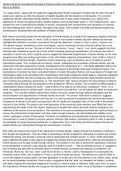‘Modern literature is fixated with the idea of trying to assert one’s identity’. Compare how writers have explored the
theme of identity.
To a large extent, I agree with the statement suggesting that ‘Modern Literature is fixated with the idea of trying to
assert one’s identity’ as often the assertion of identity equates with the assertion of individuality. For a modern
readership, identity, particularly female identity, is a focal point of many works of literature as a result of the
oppression of women throughout history. Modern authors, such as Germaine Greer in’ The Female Eunuch’, have
adopted the role of celebrating the identity of women, recognising their domestication and repression of creativity,
but memorialising their worth in society. Throughout this essay, I will consider how Duffy and Atwood explore the
domestication, empowerment and assertion of female identity.
Both Atwood and Duffy present the domestication of female identity as a result of the oppressive regimes enforcing
societal and hierarchical roles. In ‘Anon’, Duffy is critical of how women’s identity has been defined by men and
highlights the restriction of women’s expression through the statement; “maybe a nurse, a nanny, maybe a nun –”.
The adverb “maybe” establishes a sense of ambiguity, used to emphasise the lack of female identity due to the
scarcity of recognition by men. This idea is further by the tricolon; “nurse”, “nanny”, “nun” which suggests the finite,
domestic jobs available to women as a result of their societally perceived subordination. All of these roles refer to
education in some form, which could be used to suggest the discerned insignificance of female identity, as the roles
assigned were often just reciting rigid history or fact, with limited subjective interpretations. Here, Duffy is critical of
the censorship of female thought, restricting creative outpouring, such as literature, due to its ability to subvert
authoritarian power. This, coupled with the adverb “maybe” establishes the uncertainty of female identity, and the
subservient role often assumed by women, emphasises by the consonance of ‘n’. This harsh alliteration links to the
titular lexis of ‘Anon’ and recurs the idea of the loss and erasure of the female community throughout history. The
domestication of women has been a prevalent feature of society throughout history, and suppression of thought and
individuality is likely to be something both contemporary and modern audiences would relate to. Atwood’s readership
would also be familiar with this concept as a result of the popularity of second and third wave feminism around the
time of writing and publishing respectively. In ‘The Handmaid’s Tale’, Atwood presents the indoctrination of Gilead’s
Theocratic values through the domestication of the protagonist, Offred’s, identity. This is implicit as Offred adopts a
contemplative stance towards her worth; “I used to think of my body as an instrument, of pleasure,” “Now...I’m a
cloud, congealed around a central object...which is hard and more real than I am and glows red within its translucent
wrapping.”. This conveys Gilead’s autonomous control of women’s bodies through political subjugation and the
dehumanisation and objectification of female identity and worth. The phrase “instrument of pleasure” suggests
unrestrained passion, sexual freedom and free will. It is used by Atwood to emphasise the self-worth and sexual
indulgences of women in the past in juxtaposition with the rigidity and regulated state of their worth in the present,
reduced to their fertility. The graphic and vivid description of the menstrual cycle indicates how Offred has been
oppressed by the ideals of the new regime, beginning to emulate their values and even hope for pregnancy, the
fulfillment of the wishes of her persecutors. The memories of the past combatting the present are used by Atwood to
convey the enforcement of oppression, and how, under enough pressure, one will manifest and validate a new,
inferior, submissive version of themselves. Therefore, the belittlement and abolishment of female identity through
domestication is used by Gilead to produce passive, identical child bearers, diminishing rights in order to eliminate
the possibility of women becoming subversive or independent. Thus, both Duffy and Atwood present the loss of
female identity and individualism through the domestication of women.
Both Duffy and Atwood are critical of the oppression of female identity, notably through the restriction of literature,
free thought and expression. They are united in presenting a female perspective, attempting to expose and criticise
Patriarchal society, and provide a universal voice to oppressed and unheard women. In ‘Anon’, Duffy structurally
uses a different anecdote in each stanza to suggest how female stories are passed down, often not immortalised in
formal literature but through vocally through memory. This pertains to the idea of patriarchal suppression, indicated
by the declaration “A woman I knew kept her skull on a shelf in a room –”. The non descript pronoun “a” suggests a
lack of identity and also links to universal nature of female erasure, as women are reduced to a collective, not
individuals. Moreover, the noun “skull” could be an allusion to Hamlet, used by Shakespeare to contemplate the
temporary nature of life, and in relation to Yorick, a symbol of death and decay. This reference is used by Duffy to
mourn the tragedy of wasted talent, the older generation of women who had the potential to be; writers, poets, artists
etc, but were societally constricted. There is also a suggestion that the “skull” is a metaphor for intellect, curiosity
and ideas, implying the masculine disapproval of women in roles of power or influence. Duffy uses ‘Anon’ to assert
the importance of female identity and recognise the importance of women’s work. An air of frustration is established




